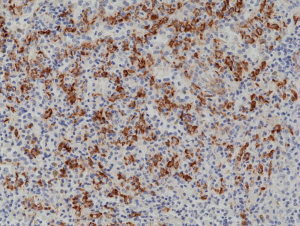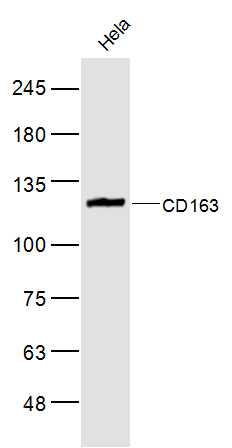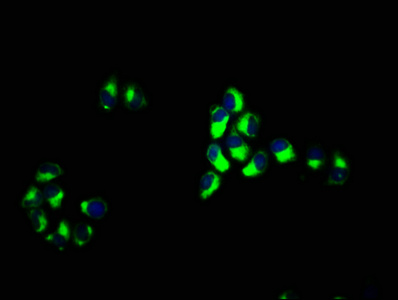
Immunohistochemical staining of formalin fixed and paraffin embedded human spleen tissue section using anti-CD163 rabbit monoclonal antibody (Clone RM371) at a 1:1000 dilution.
anti-CD163 (human), Rabbit Monoclonal (RM371)
REV-31-1257-00
ApplicationsWestern Blot, ImmunoHistoChemistry
Product group Antibodies
ReactivityHuman
TargetCD163
Overview
- SupplierRevMAb Biosciences
- Product Nameanti-CD163 (human), Rabbit Monoclonal (RM371)
- Delivery Days Customer10
- ApplicationsWestern Blot, ImmunoHistoChemistry
- CertificationResearch Use Only
- ClonalityMonoclonal
- Clone IDRM371
- Gene ID9332
- Target nameCD163
- Target descriptionCD163 molecule
- Target synonymsM130, MM130, SCARI1, scavenger receptor cysteine-rich type 1 protein M130, hemoglobin scavenger receptor, macrophage-associated antigen
- HostRabbit
- IsotypeIgG
- Protein IDQ86VB7
- Protein NameScavenger receptor cysteine-rich type 1 protein M130
- Scientific DescriptionCD163 (M130 antigen; Ber-Mac3, Ki-M8; SM4) is a membrane glycoprotein, a member of the scavenger receptor cysteine-rich superfamily, and a receptor for the hemoglobin-haptoglobin complex. CD163 protects tissues from free hemoglobin-mediated oxidative damage, and may play a role in the uptake and recycling of iron, via endocytosis of hemoglobin/haptoglobin and subsequent breakdown of heme. CD163 is expressed exclusively on the cell surface of human monocytes and macrophages that evolve predominantly in the late phase of inflammation. Specifically, CD163 is present on all CD14 positive monocytes, most CD64 positive monocytes, and shows higher expression on CD16 positive monocytes. CD163 binds hemoglobin/haptoglobin complexes in a calcium-dependent and pH-dependent manner, and exhibits a higher affinity for complexes of hemoglobin and multimeric haptoglobin of HP1F phenotype than for complexes of hemoglobin and dimeric haptoglobin of HP1S phenotype. CD163 also induces a cascade of intracellular signals that involves tyrosine kinase-dependent calcium mobilization, inositol triphosphate production and secretion of IL6 and CSF1. - Recombinant Antibody. This antibody reacts to human CD163. Applications: WB, IHC. Source: Rabbit. Liquid. 50% Glycerol/PBS with 1% BSA and 0.09% sodium azide. CD163 (M130 antigen; Ber-Mac3, Ki-M8; SM4) is a membrane glycoprotein, a member of the scavenger receptor cysteine-rich superfamily, and a receptor for the hemoglobin-haptoglobin complex. CD163 protects tissues from free hemoglobin-mediated oxidative damage, and may play a role in the uptake and recycling of iron, via endocytosis of hemoglobin/haptoglobin and subsequent breakdown of heme. CD163 is expressed exclusively on the cell surface of human monocytes and macrophages that evolve predominantly in the late phase of inflammation. Specifically, CD163 is present on all CD14 positive monocytes, most CD64 positive monocytes, and shows higher expression on CD16 positive monocytes. CD163 binds hemoglobin/haptoglobin complexes in a calcium-dependent and pH-dependent manner, and exhibits a higher affinity for complexes of hemoglobin and multimeric haptoglobin of HP1F phenotype than for complexes of hemoglobin and dimeric haptoglobin of HP1S phenotype. CD163 also induces a cascade of intracellular signals that involves tyrosine kinase-dependent calcium mobilization, inositol triphosphate production and secretion of IL6 and CSF1.
- ReactivityHuman
- Storage Instruction-20°C
- UNSPSC12352203







